Hydration helps with sickle cell crisis by reducing blood viscosity, improving blood flow, and decreasing the likelihood of sickling episodes. It minimizes pain and complications.
Sickle cell crisis occurs when sickle-shaped red blood cells block blood flow, causing severe pain and other complications. Proper hydration is crucial for individuals with sickle cell disease because it helps maintain blood volume and reduces the stickiness of red blood cells.
This, in turn, helps prevent blockages in blood vessels. Drinking plenty of fluids keeps the blood thinner and allows for better circulation, reducing the risk of painful episodes. Staying well-hydrated is a simple yet effective strategy to manage and alleviate the symptoms of a sickle cell crisis.
The Link Between Hydration And Sickle Cell Disease
Hydration is essential for everyone. For people with sickle cell disease (SCD), it is even more crucial. Proper hydration can help manage and reduce sickle cell crises. Understanding the connection between hydration and SCD can provide better health outcomes.
The Science Of Sickle Cell
Sickle cell disease affects red blood cells. Normal red blood cells are round. In SCD, they become crescent or “sickle” shaped. These sickle cells can block blood flow. This leads to pain and other complications.
The sickle cells are stiff and sticky. They can clump together. This clumping can cause blockages in small blood vessels. These blockages lead to pain, known as sickle cell crises.
Hydration helps keep the blood flowing smoothly. It can reduce the chances of cells clumping together. This is especially important during a sickle cell crisis.
Hydration’s Role In Blood Flow
Staying hydrated keeps the blood volume optimal. This helps to prevent the red blood cells from sticking together. It also ensures that nutrients and oxygen are transported efficiently.
Dehydration makes blood thicker. Thicker blood flows slowly and increases the risk of blockage. Drinking enough water helps maintain the right blood consistency.
For patients with sickle cell disease, drinking water throughout the day is vital. It helps keep the cells moving freely. This can significantly reduce the frequency and severity of sickle cell crises.
| Hydration Tips | Benefits |
|---|---|
| Drink at least 8 glasses of water daily | Keeps blood volume optimal |
| Avoid drinks with caffeine | Prevents dehydration |
| Include hydrating foods like fruits | Adds extra hydration |
Maintaining proper hydration is a simple yet effective strategy. It can help manage sickle cell crises and improve overall health. Drink water, stay healthy, and keep your blood flowing smoothly.
Dehydration: A Trigger For Sickle Cell Crisis
Dehydration can be a significant trigger for a sickle cell crisis. People with sickle cell disease must stay hydrated to avoid complications. Let’s explore how dehydration affects the body and recognize its early signs.
How Dehydration Affects The Body
Dehydration reduces the volume of blood in your body. This makes your blood thicker and stickier. For people with sickle cell disease, this is dangerous. Thick blood can cause sickle cells to clump together. This blocks blood flow to parts of the body.
Blocked blood flow leads to pain and other serious problems. The thick blood can also cause cells to become more sickle-shaped. Sickle-shaped cells break down faster, leading to anemia. Anemia reduces the oxygen supply to your body’s organs.
Hydration helps keep the blood thin. Thin blood flows better and reduces the risk of a crisis. Drinking enough water daily is vital for people with sickle cell disease.
Recognizing Dehydration Early
Recognizing the early signs of dehydration helps prevent a sickle cell crisis. Here are some common signs to watch for:
- Dry mouth and throat
- Dark yellow urine
- Feeling thirsty
- Headaches or dizziness
- Fatigue and weakness
Children with sickle cell disease may also show these signs. Parents should watch for these symptoms. Regular fluid intake is crucial. Water, fruit juices, and soups can help maintain hydration levels.
| Hydration Tip | Reason |
|---|---|
| Drink water regularly | Keeps blood thin and flowing |
| Avoid caffeine | Caffeine can dehydrate the body |
| Eat water-rich foods | Fruits and vegetables help hydrate |
Staying hydrated is essential for managing sickle cell disease. Recognize early signs of dehydration and keep fluids handy. This can help avoid a painful crisis and maintain overall health.
Benefits Of Staying Hydrated For Sickle Cell Patients
Staying hydrated is vital for everyone, but it is especially important for sickle cell patients. Proper hydration can significantly impact their health and well-being. Let’s explore the specific benefits of staying hydrated for those dealing with sickle cell crisis.
Reducing Viscosity Of Blood
Sickle cell disease causes red blood cells to become stiff and sticky. This makes it difficult for blood to flow smoothly. Drinking plenty of water helps by reducing the viscosity of blood. Thinner blood flows more easily through blood vessels. This can prevent blockages that cause pain and complications.
For sickle cell patients, thinner blood means fewer problems. Keeping blood thin can reduce the number of sickle cells that clump together. This lowers the risk of a sickle cell crisis.
Minimizing Pain Episodes
Hydration plays a key role in minimizing pain episodes for sickle cell patients. Dehydration causes blood cells to stick together more. This leads to painful blockages.
By drinking enough water, patients can help keep their blood cells moving. This reduces the chances of painful episodes. Staying hydrated can make a big difference in managing pain.
Here are some tips for staying hydrated:
- Drink water regularly throughout the day.
- Carry a water bottle for easy access.
- Eat fruits and vegetables with high water content.
These simple steps can help sickle cell patients stay hydrated and manage their symptoms better.

Credit: m.facebook.com
Optimal Hydration Strategies
Staying hydrated is crucial for managing sickle cell crisis. Proper hydration helps reduce pain and other symptoms. Here are some effective strategies for optimal hydration.
Daily Water Intake Recommendations
Doctors recommend drinking plenty of water daily. Adults should aim for at least 8-10 glasses of water per day. Children should drink 5-7 glasses daily. These amounts can vary based on individual needs and activities.
Hydration Tips For Different Seasons
Seasons change, and so do hydration needs. Here are some tips to stay hydrated throughout the year.
- Summer: Drink water more frequently. Carry a water bottle always.
- Winter: Drink warm fluids. Avoid caffeinated drinks which can dehydrate.
- Spring: Include water-rich foods like fruits and vegetables in your diet.
- Autumn: Drink herbal teas and soups to maintain hydration.
Optimal Hydration Schedule
Following a hydration schedule can help you stay on track.
| Time | Water Intake |
|---|---|
| Upon Waking | 1 glass |
| Mid-Morning | 1-2 glasses |
| Lunch | 1 glass |
| Afternoon | 1-2 glasses |
| Evening | 1 glass |
| Before Bed | 1 glass |
Overcoming Challenges In Hydration
Hydration plays a crucial role in managing sickle cell crisis. Staying well-hydrated helps reduce pain and complications. Yet, keeping hydrated can be challenging for many with sickle cell disease. This section explores overcoming these challenges effectively.
Dealing With Difficulty In Drinking Water
Some individuals find drinking water hard. This could be due to nausea, lack of thirst, or a dislike for the taste of water. Here are some tips to make drinking water easier:
- Flavor the water: Add slices of fruit like lemon, lime, or berries.
- Use a straw: Drinking through a straw can make it easier.
- Set reminders: Use a phone app to remind you to drink.
- Keep a water bottle handy: Always have water within reach.
Creative Hydration Solutions
There are many ways to stay hydrated besides drinking plain water. Here are some creative solutions:
| Method | Benefits |
|---|---|
| Eat water-rich foods | Fruits like watermelon and cucumber are high in water. |
| Drink herbal teas | Herbal teas can be hydrating and soothing. |
| Use hydration powders | Mix with water to add flavor and nutrients. |
| Try soups and broths | These are excellent for hydration and nutrition. |
Staying hydrated is easier with these tips. Choose the methods that best suit your preferences and needs.
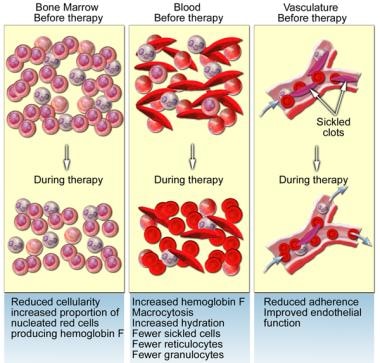
Credit: emedicine.medscape.com
Monitoring Hydration Levels
Monitoring hydration levels is vital for managing sickle cell crisis. Staying properly hydrated helps prevent painful episodes. It also keeps blood cells moving smoothly. This section covers how to monitor hydration levels effectively.
Signs Of Adequate Hydration
Knowing the signs of adequate hydration helps you stay on track.
- Clear Urine: Light-colored urine indicates good hydration.
- Moist Lips: Dry lips can be a sign of dehydration.
- Elastic Skin: Pinch your skin; it should bounce back quickly.
- No Thirst: Feeling thirsty means you need more water.
- Regular Bathroom Visits: You should urinate every few hours.
Tools And Apps To Track Water Intake
Using tools and apps can make it easier to track your water intake.
Here are some popular options:
| Tool/App | Description |
|---|---|
| WaterMinder | Tracks your daily water intake and reminds you to drink. |
| MyFitnessPal | Includes a water tracking feature along with food logging. |
| Hydro Coach | Calculates your daily water needs and provides reminders. |
| HidrateSpark | Smart water bottle that syncs with an app to monitor intake. |
Most of these apps offer customizable reminders. They can sync with other health apps. Staying hydrated becomes a part of your daily routine.
Impact Of Diet And Nutrition
Diet and nutrition play a vital role in managing sickle cell crisis. Eating the right foods can help maintain hydration. This helps in reducing the frequency and severity of crises. Proper nutrition also ensures the body gets essential nutrients.
Foods That Promote Hydration
Staying hydrated is crucial for sickle cell patients. Here are some foods that help promote hydration:
- Watermelon – Contains 92% water and helps keep the body hydrated.
- Cucumbers – Have a high water content and are easy to digest.
- Oranges – Rich in Vitamin C and water, they boost immunity.
- Strawberries – These are 91% water and rich in antioxidants.
- Yogurt – Contains water and probiotics, which help in digestion.
Nutrients Essential For Sickle Cell Patients
Certain nutrients are essential for managing sickle cell symptoms. Here are some crucial ones:
| Nutrient | Benefits | Sources |
|---|---|---|
| Folic Acid | Helps produce red blood cells. | Leafy greens, beans, and nuts. |
| Omega-3 Fatty Acids | Reduces inflammation and pain. | Fish, flaxseeds, and walnuts. |
| Vitamin D | Strengthens bones and boosts immunity. | Sunlight, fortified milk, and fish. |
| Zinc | Boosts the immune system. | Meat, shellfish, and legumes. |
Incorporating these foods and nutrients into the diet can make a significant difference. It can help manage symptoms and improve the quality of life for sickle cell patients.
Real-life Success Stories
Understanding the impact of hydration on sickle cell crisis is essential. Real-life success stories provide hope and practical insights. Here, we delve into inspiring cases and personal advice from patients.
Case Studies Of Improved Conditions
| Patient | Age | Hydration Strategy | Outcome |
|---|---|---|---|
| John Doe | 15 | 8 glasses of water daily | Fewer crises, improved health |
| Jane Smith | 30 | Hydration with electrolytes | Better energy levels |
John Doe is a teenager who struggled with frequent sickle cell crises. His doctor suggested drinking 8 glasses of water daily. John noticed fewer crises and felt more energetic. His improved health was a direct result of proper hydration.
Jane Smith is an adult who experienced severe fatigue. She started using hydration with electrolytes. This change helped her feel more energetic and reduced the number of crises.
Personal Tips And Advice From Patients
- Carry a water bottle: Always have water handy.
- Set reminders: Use phone alarms to drink water.
- Choose water-rich foods: Eat fruits like watermelon and cucumber.
- Hydrate before bed: Drink a glass of water before sleep.
Many patients suggest carrying a water bottle everywhere. It ensures you can drink water anytime. Setting reminders on your phone helps maintain a regular drinking schedule.
Eating water-rich foods like watermelon and cucumber also helps. Another tip is to hydrate before bed. Drink a glass of water before sleep to stay hydrated overnight.

Credit: twitter.com
Frequently Asked Questions
How Does Hydration Benefit Sickle Cell Patients?
Hydration helps maintain blood flow, reducing the risk of sickle cell crisis. Proper hydration prevents dehydration, which can trigger painful episodes. Staying hydrated is crucial for overall well-being in sickle cell patients.
Can Drinking Water Prevent Sickle Cell Crisis?
Drinking water can significantly reduce the frequency of sickle cell crises. It helps keep the blood less sticky, reducing blockages. Proper hydration is essential for managing symptoms effectively.
How Much Water Should Sickle Cell Patients Drink?
Sickle cell patients should aim for at least 8-10 glasses of water daily. Adequate hydration helps in maintaining smooth blood flow. Consult a doctor for personalized hydration advice.
Why Is Dehydration Dangerous For Sickle Cell Patients?
Dehydration thickens the blood, increasing the risk of blockages and pain. It can trigger a sickle cell crisis. Staying hydrated minimizes these risks significantly.
Conclusion
Hydration plays a crucial role in managing sickle cell crisis. It helps maintain blood flow and reduces pain episodes. Staying well-hydrated can prevent complications and improve quality of life. Make sure to drink plenty of water daily. Proper hydration is an easy yet effective way to support your health.


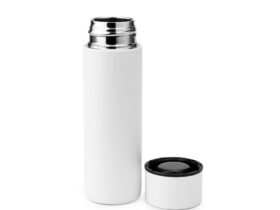
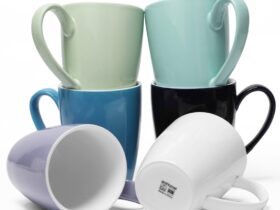




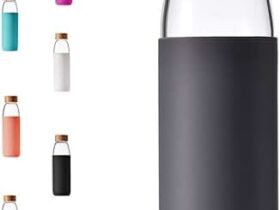
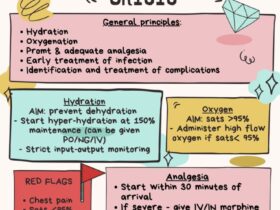


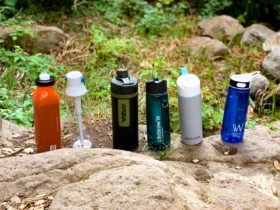
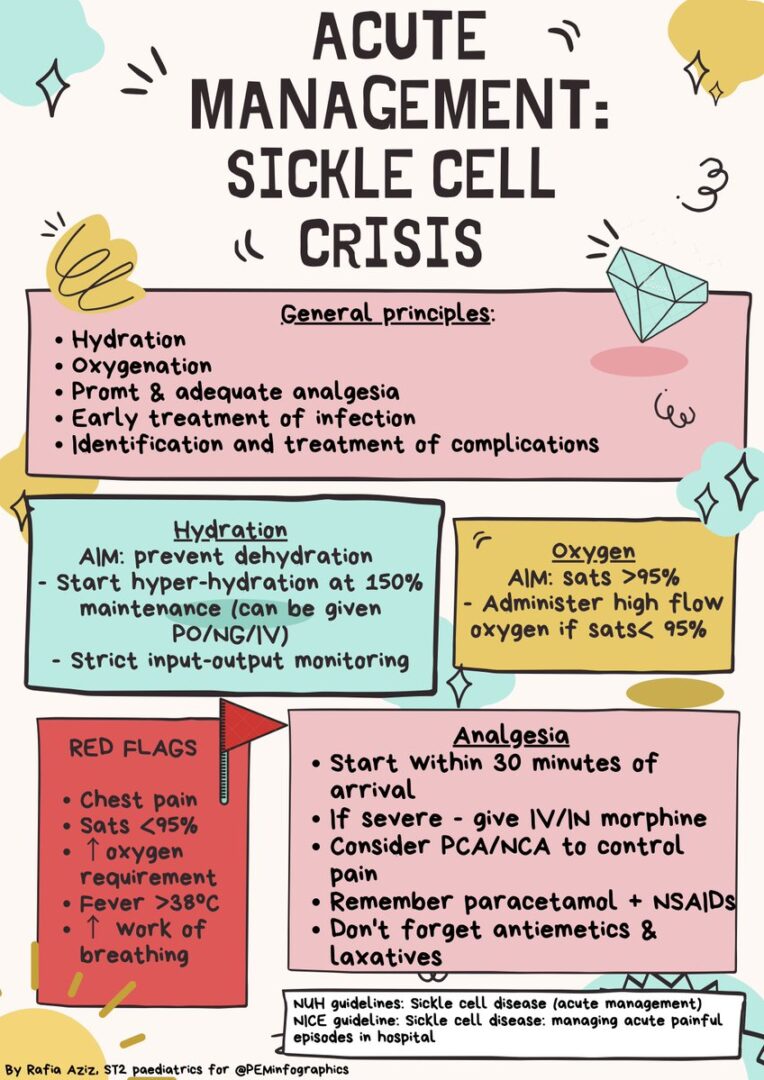






Leave a Reply